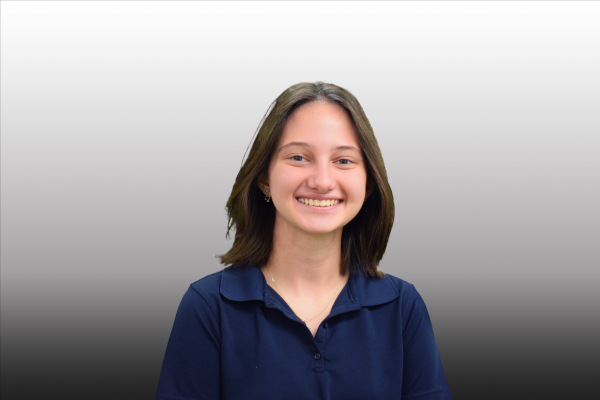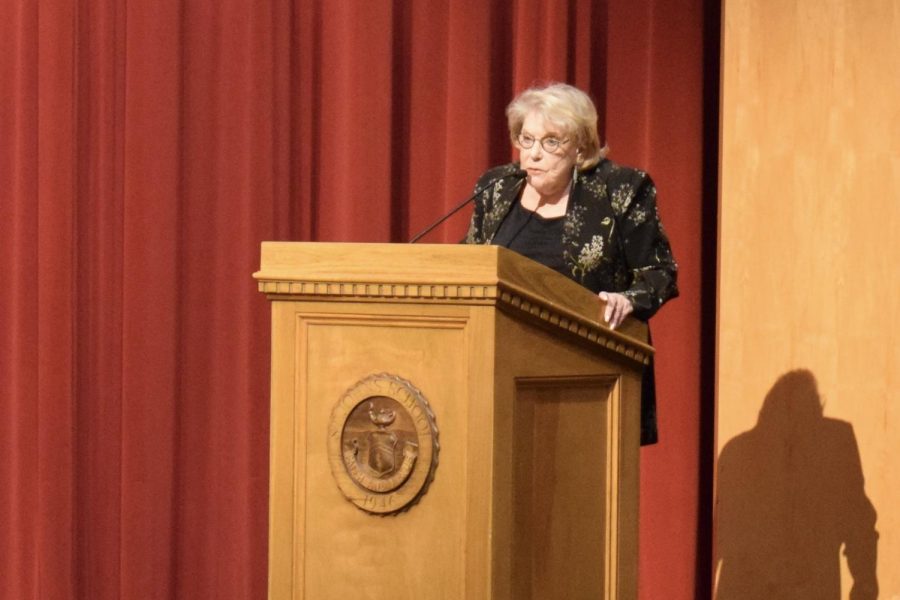“We were too young to understand any antisemitism”: Holocaust survivor Ruth Steinfeld shares her story
By the end of her emotional presentation, the audience was speechless. After a brief silence, Steinfeld received a standing ovation.
“The Holocaust is something that is very real,” said Ruth Steinfeld, survivor of the Holocaust. “And the reason we speak is that we don’t want anyone to forget.”
In October, the Jewish Affinity Group invited Steinfeld to share her story with the Upper School. Since then, antisemitism has run rampant and unchecked. Influential figures, including musician Kanye West and NBA All-Star Kyrie Irving, have publicly made numerous antisemitic remarks, highlighting the continued need for Holocaust education.
“We live in a time where it’s very easy to get away with hate and violence and not have personal accountability, and because of that, there are a lot of really nasty ideas circulating,” said JAG faculty sponsor Emily Reppart in reference to West’s Instagram and Twitter posts.
According to JAG president Hailey Jane Frank, survivors of the Holocaust had spoken at the School before, but not recently, and the affinity group felt it was important to resume the practice while there are still Holocaust survivors.
During her talk at the assembly on Jan. 12, Steinfeld chronicled her experience before, during and after the Holocaust.
Born in 1933 in Ladenburg, Germany, Steinfeld lived with her parents and her older sister, Lea. Classmates would call the two girls “dirty Jews” and pelt them with rocks on their way to school. Steinfeld recalls how the community in Ladenburg hated her family—despite them doing no harm.
“We were a wonderful family with a wonderful home, and all of a sudden, everything changed,” Steinfeld said.
In 1940, Steinfeld’s family was sent to one of the 34 internment camps in France, the Gurs near the French Pyrenees. Steinfield was forced into a cattle car and taken to the camp, where the Nazis separated the men and the women.
“That was the last time I ever saw my father.”
In the internment camp, Steinfeld slept on a small straw bed inside a dirt-filled room and was given only a filthy bowl from which to eat.
One night when she and her sister were sleeping, their mother woke them up, got them dressed and sent them away on a bus with the help of the Children’s Aid Society, a Jewish-French organization.
At the time, Steinfeld did not understand why she was leaving. She begged her mother to let her stay, promising she would be a good daughter, yet her mother insisted that she go. Steinfeld later realized that her mother was saving their lives while risking her own—and knowing that she would likely never see them again.
“My sister and I always wondered how my mother did it,” Steinfeld said. “I have lived knowing that my mother must have been the most unbelievable and unselfish because a lot of children didn’t make it like my sister and I did.”
Steinfeld’s mother made the agency promise that they would never separate the two sisters.
Steinfeld and her sister were taken to live in a castle owned by the Rothschilds, an influential family that sheltered Jewish children during the Holocaust.
She hid in the dungeon for weeks while the Children’s Aid Society taught her children’s songs in French. When the Nazis drew near, Steinfeld changed her German-sounding last name Krell to the more French Acrelles to hide her Jewish identity. Just before the Nazis arrived at the castle, she moved to another French town where she and her sister were welcomed by Monsieur and Madame Chapot and their young daughter Paulette.
“I was saved by wonderful people who were brave enough to go beyond the box.”
Steinfeld and her sister attended a Catholic school and learned Christian traditions to disguise themselves from the Nazis. Although the local priest realized they had little knowledge of Catholicism and suspected the sisters of being Jewish, he said nothing.
Soon, though, their town heard the news that Oradour-sur-Glane, a nearby town, had just been burned to the ground for sheltering only one Jewish person.
Then came the day that the local priest announced to the community that the sisters were, in fact, Jewish. Steinfeld suspected that this was an effort to protect the town from the same fate as Oradour-sur-Glane.
“He was afraid that his town would be put in the church and the church would be set on fire.”
The sisters were chased and insulted once more—a bitter reminder of their life in Germany. They moved yet again, still confused as to why people hated them for their religion.
“We were too young to understand any antisemitism. We just knew we weren’t wanted anywhere.”
After years of running from the Nazis, Steinfeld received a letter from her grandfather in 1945 that gave her the opportunity to move to America.
After a grueling two-week boat ride, Steinfeld and her sister met her grandfather and aunt in New York. By 1948, their aunt, believing Steinfeld and her sister’s English was too poor and their memory too weak, told the immigration agency that she did not want them anymore.
The agency showed the sisters a large map of the U.S., pointing to cities including Seattle and Minneapolis. But when Steinfeld’s sister saw “House-tin, Texas,” near the bottom of the map, they decided to move there, thinking they would see cowboys.
After moving to Houston, they got an apartment and worked at Sysco Foods for several years. Steinfeld’s friends were jealous because she and her sister had their own apartment, yet all of them had the only thing she really wanted.
“I was jealous of them because they had a mom and a dad. That’s all I ever wanted in my whole life—a mother and a father.”
Thanks to the language skills she acquired in France, Steinfeld became a part of Houston’s small French community. She worked as a hairdresser, married a German local car salesman named Larry Steinfeld and raised three daughters. Yet, because of the pain, she never spoke of her childhood, often dodging questions, even reminders, of her past.
“In my beauty shop, whenever I would hear somebody with a German accent, I would run away,” she said. “I didn’t want to deal with it.”
Steinfeld refused to tell even her own children about her past. The grief of losing her parents felt impossible to explain.
“If they would ask me where their grandparents were, I would just walk away and say, ‘I don’t know. They’re somewhere in Europe.’”
In 1981, Steinfeld received an invitation to a Holocaust survivor reunion in Israel. She tore it up. But then her sister asked, “Aren’t you going to go? What’s the matter with you?”
So Steinfeld booked the flight. She says it was one of the best decisions she’s ever made.
In Israel, Steinfeld visited the Yad Vashem Museum, which features a grand room housing graves illuminated by eternal lights. Each grave represents people from the same country who had died in the Holocaust. What stood out most to Steinfeld was one grave dedicated to the 1.5 million children who were killed because they were not yet 14—too young to work. At that moment, she realized it was her duty to speak for all the children who could not.
Earlier, when Steinfeld’s family proposed a trip back to Germany, Steinfeld refused.
But after her visit to Israel, she realized that she needed to go. She spent the flight in tears, realizing she was doing the one thing she thought she could never do.
When she arrived, Steinfeld and her sister visited their childhood home in Ladenburg. When they knocked on the door, an elderly German lady invited them in.
All of Steinfeld’s memories from the Holocaust came flooding back to her, and all she could do was cry.
Then the German lady started crying, too.
Steinfeld didn’t understand why the German lady was crying, but she held her in her arms.
In that moment, she realized she had to forgive the German people. Her religion asked her to accept the past and forgive, so she tried to find the strength to overcome her hatred.
“The pain and the hurt that I had felt for so many years left me,” she said. “I forgave myself. I forgave myself for hating. I forgave myself for holding that country responsible.”
After her visit to Germany, Steinfeld had the opportunity to visit Lyon, France, where she began her search for Paulette. After meeting a French man who gave her directions, she hopped into a truck and was driven to her house. She wanted to ask Paulette the one question she had been wondering since she was a little girl: “How was it that your family was so brave as to take in two little Jewish girls while knowing the consequences?”
When she found Paulette and asked her her question, the reply was simple: “Wouldn’t you?”
When Steinfeld returned to Houston, she worked to overcome her hatred by sharing stories of her life during the Holocaust. At first, she told just her children; then she told larger groups, the first being one of her daughter’s classes at the University of Texas.
“As I spoke, I never stopped crying because I had never told my story to anybody,” she said. “I felt all the pain, all the harm of losing my parents.”
In 2020, she independently published a book “Forgive, But Never Forget” to share her story with a wider audience. In recognition of her efforts to educate future generations, she received the prestigious France’s Legion of Honor award in 2021.
To her, Steinfeld’s eleven grandchildren and eight great-grandchildren are a powerful reminder that Hitler did not achieve his goal, that he failed to eliminate the Jewish people.
By the end of her emotional presentation, the audience was speechless. After a brief silence, Steinfeld received a standing ovation.
After assemblies, students usually chatter, laugh or text as they exit the building. But that day, they left in silence.
“It is so rare that you get to hear a speaker who makes an experience that you learn about in history class feel so real,” senior Grace Rustay said.
Many students were tearing up on their way to their next classes, and many teachers tried to create an open environment for students to share their thoughts, listen to each other and reflect.
“Her speech was a strong reminder that tragedies like the Holocaust don’t just exist in a textbook,” freshman Lynn Pham said. “They’re real things that happened to real people.”

Eshna Das ('26) joined The Review in 2022 as a freshman. She loves the color purple and has both a pet dog and a pet cat (no, they don't get along).

Riya Nimmagadda ('26) joined The Review in 2022 as a freshman. She can probably finish a TV show in a day and she has a weird fear of cotton balls.

Lucy Walker ('25) joined The Review in 2021 as a freshman. She enjoys discovering new bands and collecting stickers.















Venu Uppalapati • Jan 27, 2023 at 3:34 PM
Excellent article, well written. I genuinely appreciate you coming up with a heart touching article and presenting in such a great sequence. Keep writing!
Aleena Gilani • Jan 25, 2023 at 9:03 PM
Extremely well-written. One of the best articles on the site. Y’all have handled such an important topic with excellent and nuanced writing and research.
Lucy Walker • Jan 25, 2023 at 8:54 PM
Amazing article. Really impressive work, you two.